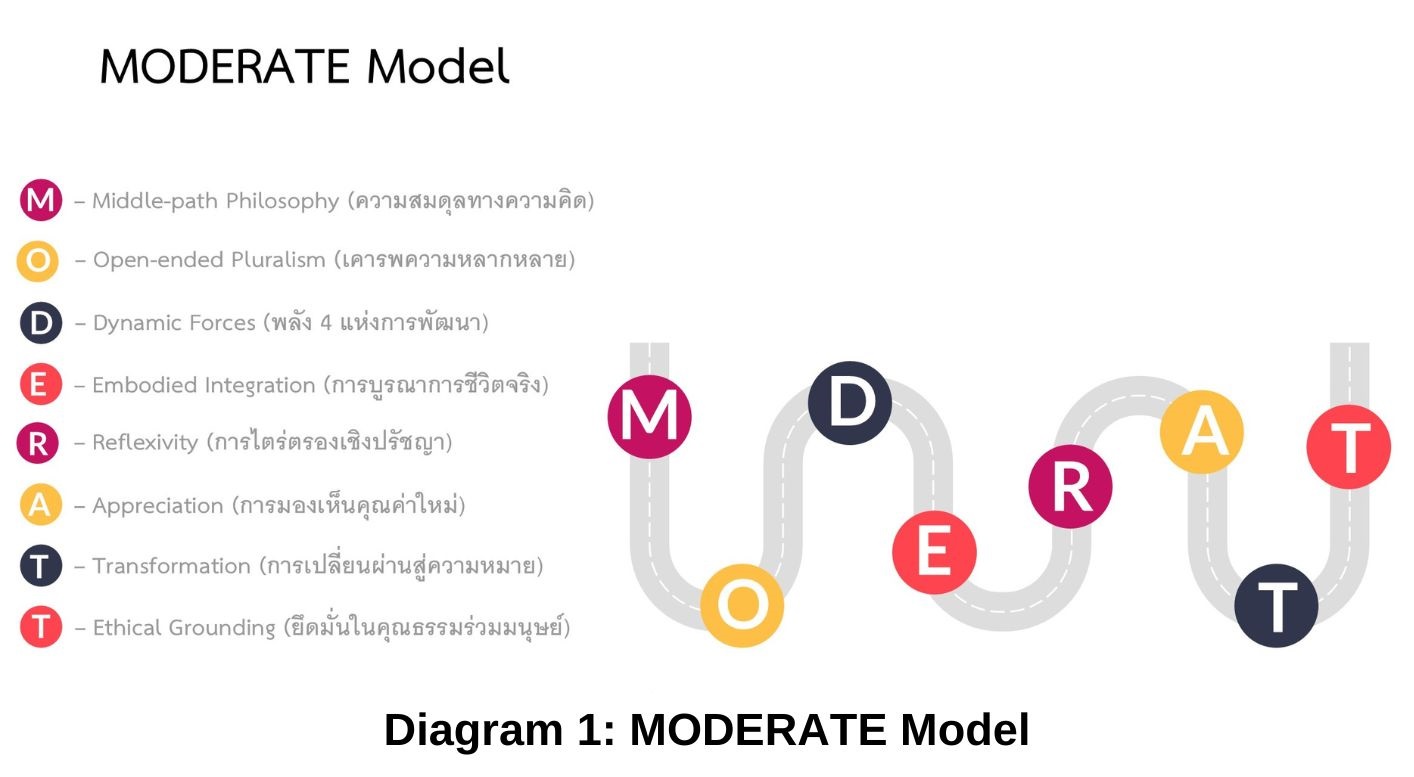The Philosophy of Moderate Postmodernism and the Development of Quality of Life
Keywords:
Moderate Postmodernism, Development, Quality of LifeAbstract
This research article aimed to (1) analyze the concepts and principles of the moderate postmodern philosophy that influence the contemporary understanding of quality of life, (2) synthesize approaches to quality of life development based on the moderate postmodern paradigm, and (3) propose an applied conceptual framework for systematic and sustainable quality of life development. A qualitative methodology was employed through documentary analysis and philosophical hermeneutics, using secondary data from theoretical, conceptual, and experiential sources. The results revealed that the moderate postmodern philosophy integrated the strengths of both modernism and postmodernism without adopting either extreme. It emphasized the balance between reason and experience, truth and meaning, and knowledge and relationships. This balance provided a comprehensive foundation for the development of quality of life. The synthesis yielded the “Four Powers” framework, consisting of Creative Power, Adaptive Power, Collaborative Power, and Explorative Power, which served as inner mechanisms that enhance holistic human well-being across individual, relational, and spiritual dimensions. The new body of knowledge developed from this study was the MODERATE Model, which comprised eight components: Middle-path Philosophy, Open-ended Pluralism, Dynamic Forces, Embodied Integration, Reflexivity, Appreciation, Transformation, and Ethical Grounding. The model was designed to integrate philosophical thought into real life, fostering a deep and sustainable development of quality of life.
References
เมธา หริมเทพาธิป. (2561). การมีส่วนร่วมในมุมมองหลังนวยุค. วารสารรมยสาร, 6(3), 63–77.
เมธา หริมเทพาธิป. (2563). การจูงใจตนเองในแนวทางหลังนวยุค. วารสารพุทธมัคค์, 5(1), 99–107.
ชัยโรจน์ นพเฉลิมโรจน์. (2565). การคิดนวัตกรรมด้วยหลักการทรงงานตามหลักปรัชญาหลังนวยุค. วารสารการวิจัยเพื่อพัฒนาชุมชน, 5(2), 111–117.
ชิสา กันยาวิริยะ, สิรินทร์ กันยาวิริยะ และเมธา หริมเทพาธิป. (2565). การบริหารตนตามหลักพุทธธรรมสำหรับนักธุรกิจ. วารสารวิจัยธรรมศึกษา, 5(2), 275–281.
พจนา มาโนช. (2566). ธุรกิจครอบครัวในกระบวนทรรศน์หลังนวยุคสายกลาง. วารสารปารมิตา, 5(2), 300–306.
สิรินทร์ กันยาวิริยะ, ชิสา กันยาวิริยะ และเมธา หริมเทพาธิป. (2565). การบริหารคนตามหลักพุทธธรรมสำหรับนักธุรกิจ. วารสารวิจัยธรรมศึกษา, 5(2), 240–249.
สุดธินีย์ ทองจันทร์, เมธา หริมเทพาธิป และรวิช ตาแก้ว. (2563). การพัฒนาคุณภาพชีวิตผู้ป่วยด้วยหลักปรัชญาหลังนวยุคสายกลาง. วารสารการวิจัยการบริหารการพัฒนา, 10(1), 99–107.
Buber, M. (1937). I and Thou. Edinburgh: T. & T. Clark.
Coutu, D. L. (2002). How resilience works. Harvard Business Review, 80(5), 46–55.
Derrida, J. (1978). Writing and Difference. University of Chicago Press.
Foucault, M. (1972). The archaeology of knowledge (A. M. Sheridan Smith, Trans.). New York : Pantheon Books.
Frankl, V. E. (1963). Man’s search for meaning: An introduction to logotherapy. Boston : Beacon Press.
Gadamer, H.-G. (1975). Truth and method (J. Weinsheimer & D. G. Marshall, Trans.). New York : Seabury Press.
Habermas, J. (1984). The theory of communicative action: Reason and the rationalization of society (Vol. 1, T. McCarthy, Trans.). Boston : Beacon Press.
Lyotard, J.-F. (1984). The postmodern condition: A report on knowledge (G. Bennington & B. Massumi, Trans.). Manchester : Manchester University Press.
Neff, K. D. (2003). Self-compassion: An alternative conceptualization of a healthy attitude toward oneself. Self and Identity, 2(2), 85–101.
Ricoeur, P. (1970). Freud and philosophy: An essay on interpretation. New Haven : Yale University Press.
Rogers, C. R. (1961). On becoming a person: A therapist’s view of psychotherapy. Boston : Houghton Mifflin.
Scharmer, O. C. (2018). The essentials of Theory U: Core principles and applications. Oakland, CA : Berrett-Koehler Publishers.
Sen, A. (1999). Development as freedom. Oxford : Oxford University Press.

Downloads
Published
How to Cite
Issue
Section
License
Copyright (c) 2025 Institute of Sufficiency Journal

This work is licensed under a Creative Commons Attribution-NonCommercial-NoDerivatives 4.0 International License.



